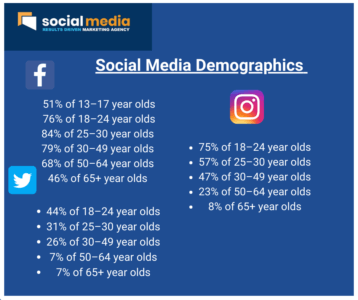Are you stumped by social media and how to harness its uses for your business? Well, the first place to start is knowing which channels to be on and why. There is no one-size-fits-all where this is concerned, so it’s important to understand the uses and benefits of each platform and compare this information with the type of industry your business falls into.
Take a look at our comprehensive guide to choosing where you ought to be focusing your social media efforts.
Know your audience
The first thing to consider is which platforms your audience are most likely too frequent. A good place to start your research is to look at the age demographics for each profile – if you’re a brand specialising in walking sticks for the elderly, you’re hardly going to want to be throwing all your eggs into the TikTok basket, made up of principally younger users.
In August 2020, these were the demographics across the 3 most popular social media platforms, Facebook, Twitter and Instagram:
Staying up-to-date with statistics such as these will ensure you’re using the right channels to target potential customers. In addition, following accounts who are clued up on what’s happening in the general world of social media is always healthy for your business and will help you drive your strategy in the right direction.
What to share, where
Let’s take a look at the notable points for some of the most popular social media channels out there:
- Spread the word: Great for businesses who rely on reviews to generate interest. Popular for content curation and link sharing.
- Elaborate: allows for longer form posts (unlike Twitter which limits you to 280 characters, for example).
- Create relationships: Facebook Live allows you to share announcements in real time – a great tool for building a closer rapport with your users and with potential influencers.
- Great targeting tools: Facebook offers the best targeting options in online advertising. It’s also highly compatible with Google Ads.
- Fast-growing user base: Instagram is now the second most important social media channel for marketers, having overtaken Twitter LinkedIn.
- All about the visuals: including photos, videos and Instagram Stories – the latter is the most popular type of content on Instagram.
- All the tools you need: Instagram has a variety of photo editing (and display) tools built in to the platform, allowing for great visual branding opportunities, especially for B2C brands.
- Spread the word: users are particularly engaged by link sharing and debate.
- Engaged users: 82% of people on Twitter actively engage with brands.
- Fast audience reaction: great for newsworthy articles, especially if you’re quick to the table with emerging stories and articles.
- Good organic reach: so you don’t have to depend purely on ads.
- Excellent B2B platform: LinkedIn has consistently been the go-to B2B platform since its inception in 2002. Its users are business-minded.
- Reach the VIPs: such as those high up the food chain and decision makers in a business.
- Learn about your industry: LinkedIn is a fountain of knowledge when it comes to more in-depth advice and articles about industry news.
Managing your social media presence
Now that you’ve deduced which platforms you ought to be on, you’ll want to consider a content strategy that helps your social media efforts work to drive sales. Part of this is creating a content calendar and using a scheduling tool such as Hootsuite, Sprout or Later to plan your content in advance and in conjunction with notable dates and events that are relevant to your business.
Here at Social Media, we’ve helped international brands develop their content strategies to get ahead of their competitors – planning in advance is absolutely key to success.
The moral of the story is…..
There is no single correct answer to the question ‘how many social media networks should my business be on?’ as this depends on several factors including:
- Which industry you’re in.
- The type of audience you’re catering for.
- Whether you’re trying to reach a new demographic you haven’t done in the past.
- Whether you’re product or service-based.
- If you’re planning on managing your social media strategy yourself, whether you have sufficient time to conduct continuous research to get the best out of your online presence.
In the case of the latter point, if you’re looking to focus your time on the areas of your business you know best, why not consider having an expert team take the strain off your hands? Here at Social Media, our team have experience working on campaigns of all sizes and across all the major social media channels. Contact us today to find out more.










